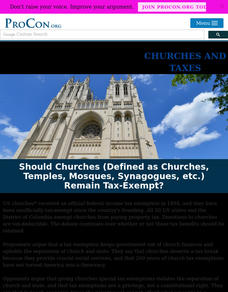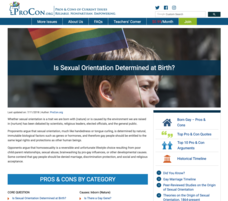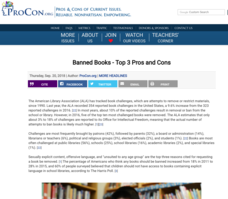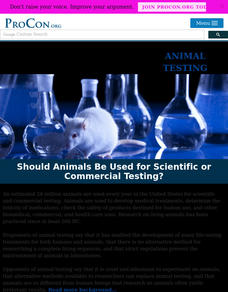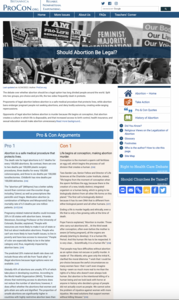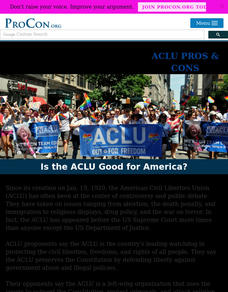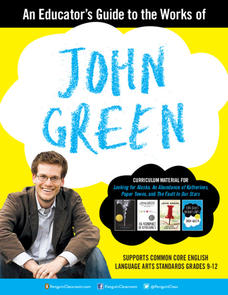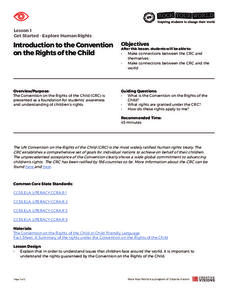Curated OER
Climate Change
Rising sea levels, strong storms, melting ice ... who or what is to blame? Scholars browse the website in preparation for a class discussion or debate about whether human activity is causing climate change. They gain a balanced...
Curated OER
Churches and Taxes
Churches have been tax-exempt since the founding of America, but should they be? Pupils ponder the question as they browse the website in preparation for a class debate or discussion. They research the history of tax-exemption for...
Curated OER
Cell Phone Radiation
Should people be more worried about cell phone radiation? Scholars read extensive background information about the issue to prepare for a class discussion or debate. As they explore the website, they learn the main arguments for and...
Curated OER
Bottled Water Ban
Convenience, taste, portability ... what's not to love about bottled water? Apparently, a lot. Scholars analyze the four main arguments supporting and opposing the sale of bottled water. They explore the health, environmental, and...
Curated OER
Born Gay
Is a person's sexual orientation determined at birth? With the informative website, scholars prepare for a debate about the topic. They learn the top pro and con arguments and read through a historical timeline of homosexuality. They...
Curated OER
Banned Books
Should people be able to ban books from schools and libraries if they find them objectionable? Scholars read the three main pros and cons regarding banned books. They also review a list of the top 10 challenged books from 2017 and...
Curated OER
Animal Testing
Animal testing: cruel and inhumane, or innovative and life-saving? Scholars explore the topic and form their own opinions with help from the highly informative website. Pupils read a comprehensive overview of the topic, including...
Curated OER
Abortion
Abortion has remained a highly controversial issue ever since the landmark 1973 Roe v. Wade decision. Using the website, learners sift through all the information they need to participate in a debate about the topic. They learn about the...
Curated OER
ACLU
Is the American Civil Liberties Union (ACLU) good for America? The informative website is a one-stop shop for ACLU debate resources. Scholars read about the topics surrounding the issue, including free speech, national security, and...
Penguin Books
An Educator’s Guide to the Works of John Green
The novels of John Green cover the gamut of teenager emotions. A guide to his works provides classroom lesson plans for the novels Looking for Alaska, An Abundance of Katherines, The Fault in Our Stars, and Paper Towns. Each lesson...
Pearson
Musical Theater Performance
Musical theater is a trifecta, requiring cast members to be actors, singers, and dancers. Help theater arts students develop these skills with a unit designed to prepare them for a staging of a musical.
Howard Hughes Medical Institute
Lactose Intolerance: Fact or Fiction
Around the world, about 2/3 of adult humans are lactose intolerant. Scholars work in small groups to discuss a few statements about lactose intolerance. Then, they watch a video on the topic and readdress each statement. Whole-class...
Sir Peter Blake Trust
Learn About Leadership
Sir Peter Blake was an award-winning New Zealand yachtsman who was killed by pirates in 2001. Scholars learn about his leadership qualities in a fun lesson that combines games, writing, and discussion. Pupils also reflect on ideas of...
Kansas Department for Aging and Disability Services
Leadership Activities
Implementing culture change within an existing organization begins with effective leadership. Scholars explore organizational leadership by reading and discussing case studies about nursing homes. They also write personal mission...
WE Charity
High School–Module 2: Circular Economy and Nature
Everyone's heard the popular slogan reduce, reuse, recycle, but there may be a better way to talk about sustainability. Using the second lesson from the five-part WE Are Innovators—High School Modules series, learners explore issues...
WE Charity
High School–Module 1: Sustainable Innovation
What does it mean to have an innovative mindset? Pupils think outside the box with the first of five lessons from the WE Are Innovators—High School Modules set. Scholars read articles and watch videos about sustainable innovation, such...
Creative Visions Foundation
Creating Your Own Original Interpretation of the UDHR
How can visual aids enhance understanding of a complex topic? With the third of four lessons from the Introduction to the Declaration of Human Rights (UDHR) set, scholars view illustrations online from the book We Are All Born Free and...
Howard Hughes Medical Institute
The Making of a Theory—Fact or Fiction
Two scientists, two independent studies, two similar theories! A video lesson presents the work of Charles Darwin and Alfred Wallace that led to their theories on evolution. Scholars then evaluate statements and provide evidence to...
WE Charity
High School–Module 5: Transportation Solutions
Planes, trains, and automobiles ... the abundance of today's transportation options comes at a hefty price. Using the fifth and final lesson plan from the WE Are Innovators—High School Modules set, pupils explore how modern...
WE Charity
High School–Module 4: Energy and Housing
What features make a home energy-efficient? Pupils attempt to answer the question with the fourth lesson from the five-part WE Are Innovators—High School Modules set. Scholars learn how certain building materials help save energy. Using...
WE Charity
High School–Module 3: Food Waste
Advances in packaging and refrigeration help keep food fresher longer. That's just one of the ways science is addressing global food waste. With the third of five lessons from the WE Are Innovators—High School Modules set, scholars use...
WE Charity
Activity: Exploring the Four Leadership Styles
Mahatma Gandhi, Nelson Mandela, and Mother Teresa were some of the greatest leaders of all time; what made them so great? Scholars discover the qualities of effective leaders using teen leadership activities. Learners complete an...
Creative Visions Foundation
Visual Interpretations of the CRC
How can people better understand the human rights that are guaranteed to children around the world? Pupils attempt to answer the question with the second of two lessons explaining the Introduction to the Convention on the Rights of the...
Creative Visions Foundation
Introduction to the Convention on the Rights of the Child
The UN Conventions on the Rights of the Child (CRC) has been ratified by 196 countries so far ... and still counting! Using the first of two lessons covering the Introduction to the Convention on the Rights of the Child, scholars learn...



